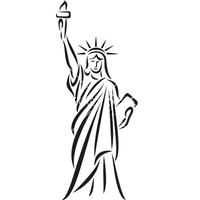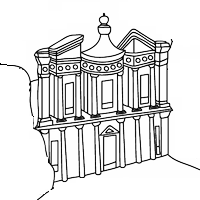The inauguration of the Eiffel Tower took place on March 31, 1889, just after the end of the construction of the metal structure. The workers were still working on it, but it was for the installation of the machinery and the installation of the elevators, plus certain finishes, here and there. But the main one, the skeleton, was finished. At the top stood the pole ready to receive the tricolor flag, which was the symbol of the official inauguration.
La journée inaugurale
The day began with a big meeting inside the West Pier. 200 hundred workers had been gathered for a quick lunch around Gustave Eiffel and some officials. At 1:30 pm they abandoned the workers and began to climb the steps to the top of the tower. Remember that the elevators were not yet installed, they will be a few weeks later. Alongside Gustave Eiffel, there was Georges Berger and his secretary, Mr Thurneyssen, Mr Chautemps and Mr Jacques, Mr Contamin and Mr Pierron, engineer of the exhibition. They arrived on the platform of the 3rd floor an hour later, at 14:30. It was almost immediately that Mr. Eiffel hung the flag on the pole and hoisted it. This flag was 7.5m wide and 4.5m high. At this moment there was a detonation, caused from the ground, then another, a third, all at regular intervals: The cannons made an inaugural shot! There were 20 cannons to celebrate the event.
Then everyone came down to the West pillar where a surprise awaited them: the presence of Mr Tirard, Minister, Mr Alphand, Commissioner of the World Fair. Mr Eiffel spoke and made a rather classic speech in which he emphasized national greatness, the honor of having been the one who had the challenge of building a 1000-foot tower, and thanked all those who participated to its construction. He did not make the details of the people, but mentioned some of them. Finally he added a few sentences to recall the importance of the construction of the tower and the trace that it had to leave in the history of French industry. The following speech was delivered by the Minister, Mr. Tirard. The latter did not hesitate to make his mea culpa by admitting not having believed in the project, initially, but recognizing that with a great force of will the human can lift mountains, which has been done here. He also congratulated the workers and made the announcement that Gustave Eiffel was proposed as a recipient of the rank of Officer of the Legion of Honor. This announcement, according to Eiffel, was greeted by vivas of workers. Then came the speech, in short, two workers, Mr Rondel, mechanic and a fellow carpenter carpenter, they took the opportunity to offer Mr Eiffel a bouquet. The content of their speech was to pay tribute to the will of the builder and thank him for his work. They ended with "Long live the engineer Eiffel! Long live France! Long live the Republic!"
In the meantime Mr Chautemps, representing the Paris Municipal Council, handed the workers a bonus of 1,000 francs to be distributed among all. This news was of course well received.
There was one last speech to make, that of Mr Alphand. It was brief and thanked Eiffel while highlighting the workers. Moreover, he concludes with the words "Thank you for the workers!", Which raised with their share shouts of joy and many applause. Mr Alphand distributed the commemorative commemorative medals which had been struck a few days earlier. These medals were rewards offered by the city of Paris for all those who had participated in the construction of the building. The day ended with a lunch during which the good mood was in order, then everyone went off to his business.
When compared to the ceremonies inaugurating monuments today, especially for a monument comparable to the Eiffel Tower, it is obvious that what happened that day was brief and very simple. It's true, we can say, but it was in the norm of the time. Indeed, at the end of the nineteenth century the means of communication were limited to the print media, so it is useless to make big ceremonies to preserve for life imposing images, as nowadays. Moreover, the honor of having participated in the greatness of France was such a feeling that it was enough to put forward this argument to give the feeling to all that they had achieved a great action, even if the work was simple. to do. Finally at that time the joy was simple. We raise the tricolor flag, we make speeches and the tower is inaugurated, it was useless to spend several days there. This is a feeling that was not typically French because if we compare with the Americans, at the same time, they inaugurated the Statue of Liberty in one day. Certainly there were more organized events, but the Americans were also more numerous, and they took 20 years to build, this statue, where the French have done in a few years.
Note that this day was attended by a journalist of the press (by force, the radio and television will appear only years later, thanks to ... the Eiffel Tower). The newspaper was "The Field of Mars", in its issue of April 6, 1889.
The speeches
Speech of Mr Eiffel
My dear friends,
I have just had great satisfaction, having floated our national flag on the tallest building man has ever built.
Here we are at the end of our task; but, to reach it, how many efforts have been made by us all, whether as intelligence or as work! How steadfast it was for me and my immediate collaborators to prepare and coordinate the work, for you to execute it in the midst of bad weather, by the cold and the wind that you so often braved on this high summit ! But we felt that, committed to this path, there was no turning back, and that having promised to carry out a work often attempted or dreamed, but never executed by any people, we had to keep our word, under pain of jeopardize part of the national honor.
This word is here, thanks to a dedication contest to which I must pay tribute, and I am sure you will join in.
I will particularly mention my faithful collaborators, MM. Nouguier, Koechlin, Salles, and Gobert, your chief M. Compagnon, whose praise I no longer have to praise, and his second Monsieur Milon, whose energy and cautious skill have rendered us so many services in difficult assemblages. I will also tell you about our staff at the Levallois workshops, our numerous draughtsmen, led by their excellent conductor M. Pluot, and your comrades, at the head of which are Letourneau, Pentecost and Gagnot. their care and their skill that the pieces arrived well enough prepared so that their assembly could always be carried out in really easy conditions.
I will not forget either Mr. Sauvestre, our architect, who has given us his excellent assistance to ensure the beauty of our work.
I say our work; indeed, it is a work that is common to all of us and of which we can be proud to be collaborators to varying degrees. You have all put this something that is not paid, does not buy, does not sell; I mean devotion to the work itself, without which no great thing is possible. This is what I thank you for today and I will always remember. You will also keep it, I am sure, because you have the pride of your work and you see the testimonials of sympathies that have been given to you by the presence of the eminent personalities who surround us.
You will always remember the great efforts we have made in common to show everyone that, whether by its engineers or by its workers, France still holds a great place in the world and that we are always able to succeed where the others have failed, and that to the great honor of France and the Republic.
Speech by Minister Tirard
Mr. Eiffel, and you, his collaborators, said Mr. Tirard, allow me to send you my warmest congratulations, not only on behalf of the Government, but also on behalf of the entire universe.
I am all the more comfortable talking to you as I was one of those who, at the first moment, were not convinced that the Tower could be completed. I admit that I was wrong. I am making amends.
There is in this work the testimony of what a man's energy can do.
But I also want to congratulate the brave workers, the modest collaborators of Mr. Eiffel! It is these workers who are the glory, the strength and the hope of the fatherland.
I hope the feelings I have just expressed will be ratified by visitors from around the world.
Speech by the mechanic Mr Rondel
Mr. Eiffel,
I come in the name of my comrades and friends, the workers of the Tower of three hundred meters, to express to you all our sympathies and the respect we owe you for having brought this great work to a successful conclusion. For two years, your name has sounded in the entire universe. The time has come when you can come and contemplate your grandiose idea and admire this masterpiece. Receive this present as a sign of recognition. Thank you for all my friends, thank you again. May we repeat to the children of our grandchildren that we have worked at the most imposing monument in the world! Thank you to the City Council for the honor it has given us to assist in the erection of our flag!
Long live the Eiffel engineer! Long live France ! Long live the Republic!
Speech by Mr Alphand, Commissioner of the World Exhibition
He's a worker, he says, who talks to workers. He's a comrade, who's been with you for two years and who knows what you've done, who's talking to comrades.
This Tower does honor not only to Mr. Eiffel, but to you all.
It will later be a glorious title for each of you to have worked at the Tower, and you will be able to speak with pride of your collaboration.
Mr. Eiffel is a general; but a general, to win a victory, needs good troops. If Mr. Eiffel has overcome all the difficulties, it's thanks to you.
Honor, then, not only to Mr. Eiffel, but to you all!
See also:




















